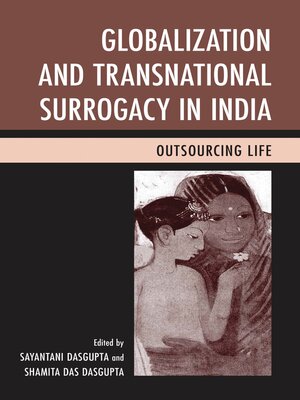
Sign up to save your library
With an OverDrive account, you can save your favorite libraries for at-a-glance information about availability. Find out more about OverDrive accounts.
Find this title in Libby, the library reading app by OverDrive.



Search for a digital library with this title
Title found at these libraries:
| Library Name | Distance |
|---|---|
| Loading... |
From computer support and hotel reservations to laboratory results and radiographic interpretations, it seems everything can be 'outsourced' in our globalized world. One would not think so with parenthood, however, especially motherhood, as it is a fundamental activity humans have historically preserved as personal and private. In our modern age, however, the advent and accessibility of assisted reproductive technologies (ARTs) and the ease with which they have traversed global borders, has fundamentally altered the meaning of childbearing and parenting.
In thetwenty-first century, parenthood is no longer achieved only through gestation, adoption, or traditional surrogacy, but also via assisted reproductive technologies (ARTs), where science and technology play lead roles. Furthermore, in a globalized world economy, where the movement and transfer of people and commodities are increasing to serve the interests of capitalism, gamete donation and surrogate birth can traverse innumerable geographic, socio-economic, racialized, and political borderlands. Thus, reproduction itself can be outsourced.
This edited volume explores one specific aspect of the new assisted reproductive technologies: gestational surrogacy and how its practice is changing the traditional concept of parenthood across the globe. The phenomenon of transnational surrogacy has given rise to a thriving international industry where money is being 'legally' exchanged for babies and 'reproductive labor' has taken on a lucrative commercial tone. Yet, law, research, and activism are barely aware of this experience and are still playing catch-up with rapidly changing on-the-ground realities. This interdisciplinary collection of essays assuages the dearth of knowledge and addresses significant issues in transnational commercial gestational surrogacy as it takes shape in a peculiar relation between the West (primarily the United States) and India.
In thetwenty-first century, parenthood is no longer achieved only through gestation, adoption, or traditional surrogacy, but also via assisted reproductive technologies (ARTs), where science and technology play lead roles. Furthermore, in a globalized world economy, where the movement and transfer of people and commodities are increasing to serve the interests of capitalism, gamete donation and surrogate birth can traverse innumerable geographic, socio-economic, racialized, and political borderlands. Thus, reproduction itself can be outsourced.
This edited volume explores one specific aspect of the new assisted reproductive technologies: gestational surrogacy and how its practice is changing the traditional concept of parenthood across the globe. The phenomenon of transnational surrogacy has given rise to a thriving international industry where money is being 'legally' exchanged for babies and 'reproductive labor' has taken on a lucrative commercial tone. Yet, law, research, and activism are barely aware of this experience and are still playing catch-up with rapidly changing on-the-ground realities. This interdisciplinary collection of essays assuages the dearth of knowledge and addresses significant issues in transnational commercial gestational surrogacy as it takes shape in a peculiar relation between the West (primarily the United States) and India.







